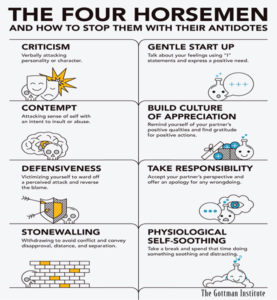Couples conflict: Why do we keep hurting each other and fighting about the same thing?
laura on 25/02/2023

Photo by Nathan Dumlao on Unsplash
Conflict is a natural and unavoidable part of intimate relationships. Conflict often has a functional purpose and can actually provide opportunities for deeper connection and understanding. All relationships, even the most successful ones, have conflict. Gottman & Gottman’s longitudinal research on couples found that approximately 31% of couple conflict is solvable whilst 69% of disagreement in all relationships are associated with unresolvable perpetual problems. Perpetual problems are usually linked to 1) primary differences in personalities that repeatedly create conflict 2) primary differences in important lifestyle needs that are fundamental to identity as a person.
Examples of Perpetual Problems:
- Differences in handling finances e.g.: one person has a philosophy of living in the now whilst the other is more conservative and wants to save for the future.
- Differences in punctuality e.g.: one person is always late whilst the other likes to be on time.
- Differences in organization and neatness e.g.: one person likes to keep an ordered clean house, the other is messy and disorganized.
- Differences in how to raise and discipline children e.g.: one person is stricter and believes in consequences more than the other.
- Differences in importance of social networks/people oriented e.g.: one person enjoys going out and is more gregarious or extraverted than the other.
- Differences in independence e.g.: one person feels a greater need to be independent than the other.
- Differences in sexual frequency e.g.: one person wants sex more than the other.
How can we manage conflict better?
Research by Gottman & Gottman highlights that it is not the presence of conflict itself that is important, but how couples manage conflict through dialogue that predicts success or failure of a relationship. What we know by the research is that good relationships are characterized by respectful, “softened” dialogue, accepting influence, de-escalation of negativity, and bids for connection/repair attempts when things are good and also around these perpetual problems. What matters is not solving the problem but rather the affect when discussing the problem, acceptance of the partner, understanding what lies beneath, humour, and a desire to improve or actively cope with this perpetual problem. Importantly a positive effect and a ratio of positive to negative interaction during conflict being at or greater than 5 :1 was found to be important for relationships to be stable. Unfortunately, dysfunctional relationships may engage in conflict managing styles that insist on sides/winning. This is when the problem becomes gridlocked and we may experience feelings of hurt, sadness and loneliness. These painful exchanges often involve the four horsemen.
The Four Horsemen and their antidotes
- Criticism
Do you sometimes attack your partner’s character? Sometimes we even “kitchen sink” the conversation whereby we pile another dirty dish of criticism into the conversation which adds to the negativity. Criticism involves blame and often starts with “You”. Using gentle start ups that involve “I” statements associated with what we feel (what emotion lies beneath this criticism?) and need is a way of still expressing our concerns, but without blame.
Example: Criticism – “Oh my god! You keep coming home so late. You are so selfish and inconsiderate”.
Antidote (gentle start up and stating positive need) – “ I feel so worried and stressed when you are home late. I love you and need you to let me know that you will be late”.
- Contempt
Do you sometimes move to name calling, sarcasm, head shaking, mockery or eye rolling? Contempt is when we think we are morally superior and look down upon someone. Contempt is the greatest predictor of divorce. Building a culture of appreciation, respect, admiration, gratitude and affection in your relationship will help stop this negativity seeping into your relationship. Small positive interactions everyday help ward off contempt. Expressing understanding rather than contemptuous statements is important.
Example: Contempt – “You forgot to hang out the washing again this morning. Oh, congratulations baby! You are gold medal lazy” (says with eye roll)
Antidote (appreciation) – “I know and understand how busy with work you have been. I’d really appreciate it if you could remember to hang the washing before you leave”.
- Defensiveness
Do you sometimes offer reasoning or even switch to blaming your partner rather than taking responsibility for your behaviour? Defensiveness is really about suggesting the problem isn’t you but them. It is a kind of self-righteousness and can also present as being the victim. By taking responsibility (for even some small part) we can manage this horseman and de-escalate things.
Example: Defensiveness – “ It’s not my fault I didn’t pick up takeaway on the way home even though I promised this morning. I’m busy! Get over it! Why didn’t you just do it!
Antidote (responsibility) – “Oh gosh, I am sorry I forgot the takeaway I promised to pick up. I should have actually asked you to grab it for us, because I knew I was going to be so busy at work. Sorry, that’s my fault. Let me call them now and order for us”.
- Stonewalling
Do you sometimes shut down and walk away from a conflict? Stonewalling is often in response to our feelings of being overwhelmed or emotionally flooded. Diffuse physiological arousal can occur whereby heart beat increases, stress hormones are released and the fight or flight response is activated. Time out (approximately 15-20minutes) to self soothe (e.g.: deep breathing, listen to music) yet returning to your partner is the antidote.
Example: Stone walling – “You keep carrying on. There you go, over and over. Pathetic. There’s no point. I’ve had enough” (turns back on partner and leaves partner)
Antidote (self soothe) – “We aren’t getting anywhere on this at the moment and I’m sorry but I’m feeling really overwhelmed. Can I have a 20minute break and then come back to talk when I am calmer?”.
Image source: https://www.gottman.com/blog/the-four-horsemen-recognizing-criticism-contempt-defensiveness-and-stonewalling/
Help and support is available for couples at Your Mind Matters (YMM)!
If you are tired of getting into upsetting arguments with your partner and want some help learning to communicate without things getting gridlocked, why not call us today? Couples therapy at Your Mind Matters aims to help teach specific tools to enhance friendship, manage conflict, create shared meaning and in turn deepen intimacy in your relationship. We will work together in helping you identify your relationships strengths, its wounds, and ways to gently navigate the vulnerabilities.
Our team of highly skilled professionals are here to help. Call us now and take the first step in enriching your relationship and living a more fulfilled life.
References
Gottman J.M & Schwartz Gottman J, (2000-2016) Level 1 and 2 Clinical Training Manuals: Gottman Method Couples Therapy.
This blog was written by Karen Dreher – Counsellor at YMM.
Karen is a member of The Australian Counselling Association (ACA). She has completed a Masters of Counselling, a Graduate Diploma in Psychology, and additional training in Gottman (couples) Therapy.
Karen is a person-centred counsellor who values the diversity of human narrative and her client’s own personal meanings, experiences and feelings. She has a particular interest in working with couples. Karen provides a warm, empathetic, authentic space that supports clients in engaging in their own self-understanding and healthy well-being.
To learn more about Karen, check out the “Our Team” page on our website! https://yourmindmatters.net.au/our-team/
- Category: Couples Therapy, Relationships






